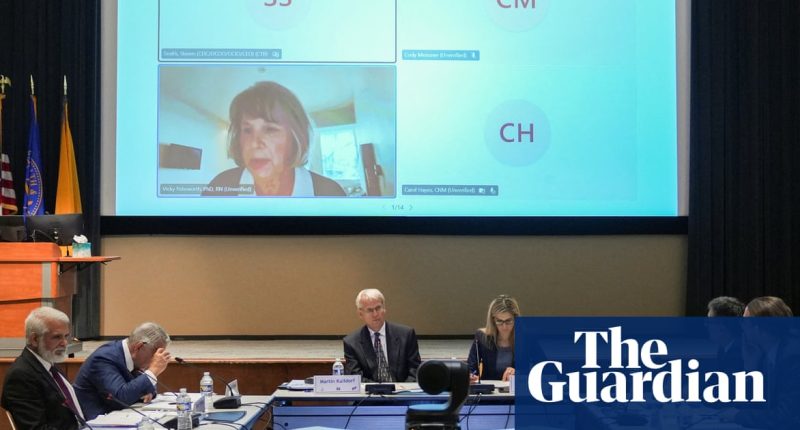Share this @internewscast.com
Health secretary Robert F Kennedy Jr’s reconstituted vaccine advisory panel recommended a new treatment to prevent respiratory syncytial virus (RSV) in infants.
The treatment, a new monoclonal antibody called clesrovimab, which will be sold under the brand name Enflonsia by Merck, was recommended by the powerful committee after being approved by the Food and Drug Administration (FDA) roughly two weeks ago.
The tortured vote took place a day late and after rounds of questions from the panel’s seven new members – all ideological allies of Kennedy, who views “overmedicalization” as one of the greatest threats to American children.
“I think we need to ask ourselves what the parent would say given this data,” said Dr Retsef Levi, a Massachusetts Institute of Technology professor of operations management, who over hours of hearings has proven to be an outspoken skeptic of the medications under review. He said he would be “concerned” and ultimately voted against recommending the monoclonal antibody.
The panel, formally called the Centers for Disease Control and Prevention’s advisory committee on immunization practices (ACIP), is a critical federal advisory board that recommends how the agency should distribute vaccines and other interventions, such as monoclonal antibodies, to the American public.
Kennedy’s decision to remove its 17 serving members and replace them with hand-picked appointments has been roundly condemned by the medical establishment. The meetings are must-watch in scientific and medical circles.
The vote is just one order of business for the panel, which is set to consider a much more controversial issue this afternoon – thimerosal in influenza vaccines. The ethylmercury-based preservative was removed from routine childhood vaccines in the early 2000s, but its use is considered an issue of settled science.
Thimerosal use has remained a talking point for anti-vaccine advocates for decades. The preservative is contained in multi-dose vials of influenza vaccines. Experts have argued that removing the ingredient would force manufacturers to ship only single-use vials, which would be more expensive. Curtailing vaccine access has been a goal of anti-vaccine advocates.
Kennedy unilaterally fired all 17 members of the ACIP in June citing conflicts of interest, and replaced the group with eight ideological allies. One of those appointees, Dr Michael Ross, dropped out of the panel on Tuesday after a government financial review, and after it was publicly reported that he was not employed by two universities where Kennedy said he held appointments. That has left seven members – far less than the panel’s typical 19 voting members.
The vote for members was whether to recommend clesrovimab, a monoclonal antibody, for all infants younger than eight months old born during or entering RSV season. They also voted on whether to include that drug in an important program called Vaccines for Children, through which about half of all American children access vaccines.
Although five members ultimately voted yes, it was only after lengthy discussion, a “no” vote from Levi, and a second “no” from nurse Vicky Pebsworth, who served as the volunteer research director for one of the nation’s oldest prominent anti-vaccine groups.
after newsletter promotion
RSV is the leading cause of hospitalization among US infants, and most infants are infected in the first year of life. Between 2% and 3% are hospitalized, a majority of whom have no underlying health conditions. Prior to 2023, there was no long-acting prevention for RSV.
The efficacy of monoclonal antibodies wanes over time. Although some ACIP members asked whether it was problematic to push the likely transmission of the disease to toddlerhood, CDC career scientists said that was the point – the most dangerous time for a child to contract RSV is in the first months of life.
“Part of what we want to do is protect them when they’re most vulnerable,” said Adam McNeil, CDC deputy branch chief for epidemiology in respiratory viruses. “The biggest impact among those newborns is getting those [ages] zero to two months [old] – and getting them through that vulnerable period.”
In the 2024-2025 respiratory disease season, 57% of infants were either born to a vaccinated mother or received monoclonal antibodies at birth. As a result, hospitalizations from RSV were reduced by 30%-40%, according to CDC data.












